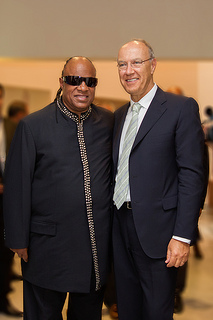Stevie Wonder Hails Landmark WIPO Treaty Boosting Access to Books for Blind and Visually Impaired Persons
Marrakesh/Geneva,
June 28, 2013
PR/2013/742
Recording legend Stevie Wonder today congratulated international negotiators who concluded a new treaty easing access to books for the blind, and urged national lawmakers to swiftly ratify the accord and unlock its benefits for hundreds of millions of people around the world who are blind, visually impaired and print-disabled.

WIPO Director General and Stevie Wonder
Celebrate Historic Marrakesh Treaty (Photo:
WIPO/Berrod)
Stevie made good on a promise earlier this week to travel to Marrakesh, Morocco, the site of the talks, to celebrate the adoption of the treaty. He is expected to play for negotiators later Friday.
“It is humbling to know that when the weakest amongst us is in need, you answered the call with a steely determination and a steadfast courage to make a difference,” Stevie told delegates as they signed the accord, adopted a day earlier. “Today we all are brothers and sisters in the struggle to make this life and the future better, not for one, but for all.”
Some 600 delegates from among the 186 members of the World Intellectual Property Organization (WIPO) joined in the debate leading to the adoption of the treaty in the Kingdom or Morocco, which hosted the Diplomatic Conference to Conclude a Treaty to Facilitate Access to Published Works by Visually Impaired Persons and Persons with Print Disabilities.
Stevie called on the delegates to return to their capitals and ensure the treaty is ratified.
“While the signing of this treaty is a historic and important step, I am respectfully and urgently asking all governments and states to prioritize ratification of this treaty so that it will become the law of the land in your respective countries and states,” he told the closing ceremony of the WIPO diplomatic conference for visually impaired persons, which met from June 17 to 28, 2013. The talks have been hosted by the Kingdom of Morocco in Marrakesh.
The Marrakesh Treaty to Facilitate Access to Published Works for Persons who are Blind, Visually Impaired, or otherwise Print Disabled addresses the “book famine” by requiring its contracting parties to adopt national law provisions that permit the reproduction, distribution and making available of published works in accessible formats through limitations and exceptions to the rights of copyright rightholders.
“To the 300 million who are visually disabled, this new treaty is a major step toward access to the basics: such as works in formats such as braille, large print text and audio books. The thirst and famine for books is coming to an end,” Stevie said.
In his closing speech, WIPO Director General Francis Gurry said the treaty, while respecting the international architecture of the copyright system, “will have a positive and concrete impact on the problem that brought us all here to Marrakesh.” He said the treaty “provides a framework for addressing that problem which is simple, workable and effective,” and thereby responds to the expectations of the blind and visually impaired.
Mr. Gurry praised “the commitment and engagement” of member states, as well as beneficiaries and the rights holders. He said the treaty is but a first step in the process, which continues with ratification and with the development of practical systems for moving works in accessible formats around the world to needy beneficiaries.
Also speaking at the closing ceremony, Morocco’s Minister of Communications and Government Spokesperson Mustapha Khalfi, who presided over the diplomatic conference, said “ten days ago we welcomed you to Marrrakesh and began work at this historical diplomatic conference – historic because of its location and because it worked to combine intellectual property and human rights.” Mr. Khalfi described the treaty as “very good” and welcomed the extensive participation of over 100 member states and 60 non-government organizations.
World Blind Union (WBU) President Maryanne Diamond said “you gave us a treaty. Better still you gave us a good treaty” - one that will change the lives of millions of people. She expressed her gratitude to the original proponents of the treaty – Brazil, Paraguay and Ecuador, thanking them for their “support, true determination and partnership.” Ms. Diamond said the lives of blind and visually impaired “will only be changed when this treaty is implemented.” She urged governments to ratify the treaty as a matter of priority, concluding “this is a day that will be recorded in history.”
International Publishers Association (IPA) President Y. S. Chi said the success of the treaty lies in whether member states ratify the treaty and implement it effectively and actively. “It is clear that neither the print disabled community nor publishers believe that this treaty alone will solve the Book Famine. That issue will be resolved by publishers adopting new technologies and integrating accessibility into their normal production process. In the interim, we are committed to safety nets. This treaty is one of those safety nets. “
On June 28, 2013, 51 member states signed the treaty and 129 signed the final act of the treaty. Signing the treaty at the end of a diplomatic conference does not necessarily bind a country to its provisions. It is however a strong indication of intent by the signatory to join the treaty. The treaty enters into force once it has received 20 ratifications.
- Tel: (+41 22) 338 81 61 / 338 72 24